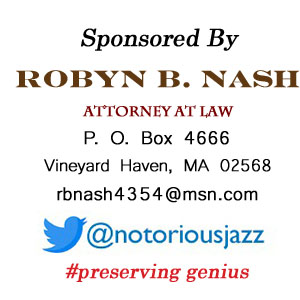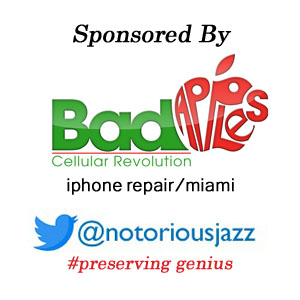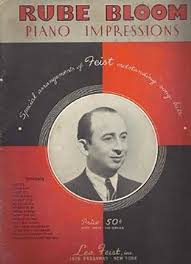
Daily Dose Of Jazz…
Reuben Bloom was born on April 24, 1902 in New York City, where he learned to play the piano. During the 1920s he wrote many novelty piano solos which are still well regarded today. He recorded for the Aeolian Company’s Duo-Art reproducing piano system various titles including his Spring Fever.
In 1927 Rube had his first hit with Soliloquy and his last hit was “Here’s to My Lady” in 1952, which he wrote with Johnny Mercer. In 1928, he made a number of records with Joe Venuti’s Blue Four for OKeh Records, including five songs he sang, as well as played piano.
He formed and led a number of bands during his career, most notably Rube Bloom and His Bayou Boys. They recorded three records in 1930 that are considered some of the best made during the early years of the Depression. The Bayou Boys was an all-star studio group consisting of Benny Goodman, Adrian Rollini, Tommy Dorsey and Mannie Klein. At other times, Bloom played with other bands, such as with Bix Beiderbecke and Frankie Trumbauer in the Sioux City Six as well as his continued frequent work with Joe Venuti’s Blue Four.
During his career, Rube also worked with many well-known performers, including Ruth Etting, Stan Kenton, Jimmy Dorsey. He collaborated with a wide number of lyricists including Ted Koehler, and Mitchell Parish. During his lifetime he published several books on the piano method.
Bloom’s I Can’t Face the Music with lyrics by Ted Koehler was recorded by Ella Fitzgerald on her 1962 Verve release, Rhythm is My Business, in a fabulous swing/big band version with Bill Doggett. Some of his best-known composition collaborations with lyricists were Day In, Day Out and Fools Rush In (Where Angels Fear to Tread) with lyrics by Johnny Mercer; Give Me the Simple Life with Harry Ruby; and Maybe You’ll Be There with lyrics by Sammy Gallop.
Pianist, vocalist, songwriter, arranger, bandleader, recording artist, and author Rube Bloom passed away on March 30, 1976 in his hometown.
More Posts: arranger,author,bandleader,history,instrumental,jazz,music,piano,recording artist,songwriter,vocal
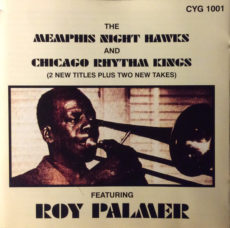
Daily Dose Of Jazz…
Roy Palmer was born on April 2, 1892 in the Carrollton neighborhood of uptown New Orleans, Louisiana. He learned to play violin, guitar, and trumpet and began his career in 1906 in the Big Easy as a guitarist with the Rozelle Orchestra. Leaving the orchestra he began playing the trombone in Storyville with Papa Celestin, Richard M. Jones, Freddie Keppard, Willie Hightower, during the DepressionTuxedo Brass Band, and Onward Brass Band.
In 1917 he left New Orleans and moved to Chicago, Illinois where he worked with King Oliver, Lawrence Duhe, and Doc Cook. From the 1920s on Palmer recorded with Johnny Dodds, Jelly Roll Morton, Ida Cox, the Alabama Rascals, and the State Street Ramblers. By the 1930s during the Depression, he curtailed his performing worked in a factory and began his career as a music teacher, which included students Preston Jackson and Albert Wynn.
Trombonist Roy Palmer passed away on December 22, 1963, in Chicago, Illinois.
More Posts: history,instrumental,jazz,music,trombone
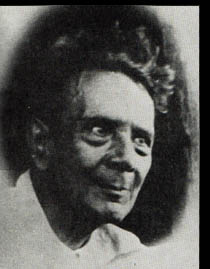
Daily Dose Of Jazz…
Emanuel Perez was born on December 28, 1871 in New Orleans, Louisiana into a Creole of Color family of Spanish, French and African descent. At the turn of the century, he became a member of the Onward Brass Band, leading it from 1903 to 1930. The Onward Brass Band was one of the most respected of its day that included King Oliver, Peter Bocage, Henry Kimball, Lorenzo Tio, Luis Tio, George Baquet, Isidore Barbarin, and Benny Williams. The Perez and Oliver two cornet, or “trumpet” team, was one of the most renowned in New Orleans.
Manuel started his own brass band, called the Imperial Orchestra, which operated from 1901 to 1908. A move north to Chicago, Illinois in 1915 saw him playing with Charles Elgar’s Creole Orchestra at the Arsonia Cafe and also with the Arthur Sims Band. Returning to the Crescent City in the Twenties, he played in Storyville, on steamboat excursions with Fate Marable and in parades with the Maple Leaf Orchestra.
Suffering a stroke in 1930, he left music during this period to work with his brother, who owned a moving company, while he ran the used furniture store. Cornetist Manuel Perez, who was a sight-reader and highly technical musician, He would go on to suffer a series of strokes that left him disabled and eventually caused his death in 1946 in New York City.
More Posts: cornet
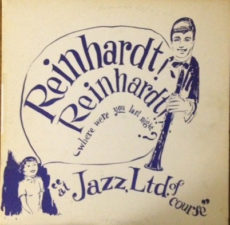
Daily Dose Of Jazz…
Quinn Brown Wilson was born on December 26, 1908 in Chicago, Illinois and played violin as a child. Studying composition and arrangement in his youth, he had his first professional experience in the mid-1920s, playing with Tiny Parham, Walter Barnes, Jelly Roll Morton, Erskine Tate, and Richard M. Jones.
The 1930s saw Quinn arranging and playing bass with Earl Hines from 1931 to 1939, in addition to playing bass on record with Jimmie Noone. Not limiting himself to just playing jazz, in the 1940s he began playing electric bass and started recording with R&B and blues musicians, including Lefty Bates and John Lee Hooker.
He continued to play jazz as well, working with Bill Reinhardt in the 1960s and Joe Kelly in the 1970s. Bassist and tubist Quinn Wilson passed away on June 14, 1978 in Evanston, Illinois.
More Posts: bass

Daily Dose Of Jazz…
Cedric Wallace was born August 3, 1909 in Miami, Florida. He moved to New York City in the 1930s, where he first started playing in a band led by Reggie Johnson at the Saratoga Club.
Later in the decade Wallace worked with Jimmie Lunceford before joining Fats Waller’s band from 1938-1942, the association for which he is best known. He played with Waller at the peak of his popularity and plays on many of his biggest hits.
He also recorded with Una Mae Carlisle, Maxine Sullivan, Champion Jack Dupree, Pat Flowers, Gene Sedric, and Dean Martin. Cedric led his own ensemble in New York in the 1940s which featured Eddie Gibbs on bass for a time, and continued to perform well into the 1970s.
Double-bassist Cedric Wallace passed away on August 19, 1985 in New York City.
#preserving genius
More Posts: bass



